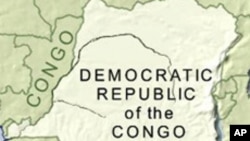U.N. Secretary-General Ban Ki-moon said Monday that the United Nations will not end support for Congolese troops, despite a Human Rights Watch appeal. The human rights monitoring group says more than 1,400 civilians have been "deliberately" killed during the first nine months of 2009 in the conflict between government and rebel forces in eastern Democratic Republic of Congo.
Human Rights Watch South Africa office chief Siphokazi Mthathi says the group found little difference between government forces and the rebel Democratic Forces for the Liberation of Rwanda, known as the FDLR, when it came to civilian abuse.
"Our report documents many atrocities that have been conducted by both sides and basically paints a picture for the civilian population in which there is nowhere to turn," said Siphokazi Mthathi. "The government forces are also targeting them and accusing them of being collaborators with the FDLR. And the FDLR obviously accuses them, vice versa."
The United Nations has documented more than 7,500 cases of sexual violence against women and girls this year through September in eastern DRC. Many of victims were subjected to gang rapes and many died as a result of the attacks.
The Congolese army is supported logistically by the United Nations Organization Mission in the Democratic Republic of the Congo, or MONUC. Human Rights Watch has urged the U.N. Security Council to suspend support of the government army in the eastern DRC until a delegation of experts recommends a new strategy for protecting civilians in the area.
When asked about the human rights appeal, the U.N.'s Ban Ki-moon said the world body has decided to suspend support to some units of the Congolese army, which are suspected of violating human rights. But he did not endorse the idea that all military support in eastern Congo should be suspended temporarily.
"There is an overall important mission that MONUC has to carry out in accordance with the Security Council mandate to preserve peace and security, and protect the civilian population. I am not sure whether it is desirable to suspend the whole peacekeeping operations," said Ban Ki-moon. "That is what the Security Council has to decide in closely following up the situation as well as assessing the situation there."
Siphokazi Mthathi with Human Rights Watch says the United Nations must share responsibility for the situation.
"As long as the U.N. continues to cooperate with government forces, who themselves have been implicated in these atrocities, then the U.N. mission is complicit," said Mthathi. "The reason the U.N. mission was sent there by the Security Council was so that it could support and boost the capacity of the government of the DRC to protect civilians as well as to protect the peace."
The head of the U.N. mission in Congo, Alan Doss, is scheduled to speak before the Security Council in New York on Wednesday. The council is expected to vote next week on renewing MONUC's mandate.
News
More Than 1,400 Civilians Reportedly Killed in DRC Conflict in Nine Months
- By Alan Boswell

Human Rights Watch says more than 1,400 civilians have been "deliberately" killed during the first nine months of 2009 in the conflict between government and rebel forces in eastern Democratic Republic of Congo



